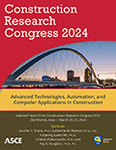Early-Age Strength Monitoring of Sensor-Embedded 3D Printed Structures
Publication: Construction Research Congress 2024
ABSTRACT
Concrete 3D printing (C3DP) is a new automated construction technology with a significant potential to reduce construction time and cost. The absence of formwork in C3DP exposes the freshly printed structures to ambient conditions and potentially excessive water evaporation. The freshly printed structures should be able to carry the service loads in a shorter time compared to conventionally cast concrete to make it possible to reduce the overall construction time. The destructive testing methods, which are usually time-consuming, are not ideal for this application, and nondestructive methods are preferred. This article provides a review of existing literature on the strength monitoring of concrete, with a focus on the early-age strength of 3D printed concrete. A new automated curing system was used to compare the effectiveness of three different curing conditions. Moreover, a new index for estimating the flexural strength of 3D printed concrete based on electrical resistivity and temperature history is proposed.
Get full access to this article
View all available purchase options and get full access to this chapter.
REFERENCES
ACI (American Concrete Institute). ACI 308. 2016. PRC-308-16 Guide to External Curing of Concrete, American Concrete Institute.
ACI (American Concrete Institute). ACI 444. 2021. PRC-444.2-21 Structural Health Monitoring Technologies for Concrete Structures-Report, American Concrete Institute.
ASTM. 2009. ASTM C78-09 Test method for flexural strength of concrete (using simple beam with third-point loading). West Conshohocken, PA, ASTM International.
Chen, C.-T., J.-J. Chang, and W.-C. Yeih. 2014. “The effects of specimen parameters on the resistivity of concrete.” Construction and Building Materials 71, 35–43.
Chung, K. L., L. Wang, M. Ghannam, M. Guan, and J. Luo. 2021. “Prediction of concrete compressive strength based on early-age effective conductivity measurement.” Journal of Building Engineering 35.
Federowicz, K., M. Kaszynska, A. Zielinski, and M. Hoffmann. 2020. “Effect of Curing Methods on Shrinkage Development in 3D-Printed Concrete.” Materials (Basel) 13(11).
Gao, S., K. L. Chung, A. Cui, M. Ghannam, J. Luo, L. Wang, M. Ma, and Z. Liao. 2021. “Accurate strength prediction models of ordinary concrete using early-age complex permittivity.” Materials and Structures 54(4), 172.
Giwa, I., D. Game, H. Ahmed, H. Noorvand, G. Arce, M. Hassan, and A. Kazemian. 2023. “Performance and macrostructural characterization of 3D printed steel fiber reinforced cementitious materials.” Construction and Building Materials 369.
Heifetz, A., D. Shribak, S. Bakhtiari, I. S. Aranson, and A. F. Bentivegna. 2021. “Qualification of 3-D Printed Mortar With Electrical Conductivity Measurements.” IEEE Transactions on Instrumentation and Measurement 70, 1–8.
Jin, X.-Y., N.-G. Jin, and Z.-J. Li. 2002. “Study on the electrical properties of young concrete.” Journal of Zhejiang University-SCIENCE A 3(2), 174–180.
Kazemian, A., I. Giwa, and M. Ekenel. 2023. Large-Scale Additive Manufacturing for Automated Construction—An Overview. Additive Manufacturing Design and Applications. M. Seifi, D. L. Bourell, W. Frazier and H. Kuhn, ASM International. 24A: 0.
Kazemian, A., and B. Khoshnevis. 2021. “Real-time extrusion quality monitoring techniques for construction 3D printing.” Construction and Building Materials 303.
Kazemian, A., X. Yuan, E. Cochran, and B. Khoshnevis. 2017. “Cementitious materials for construction-scale 3D printing: Laboratory testing of fresh printing mixture.” Construction and Building Materials 145, 639–647.
Kazemian, A., X. Yuan, O. Davtalab, and B. Khoshnevis. 2019. “Computer vision for real-time extrusion quality monitoring and control in robotic construction.” Automation in Construction 101, 92–98.
Khoshnevis, B. 1997. “Contour crafting: a new rapid prototyping process.” In International Conference on Rapid Prototyping, San Francisco, California, 13–22.
Layssi, H., P. Ghods, A. R. Alizadeh, and M. Salehi. 2015. “Electrical resistivity of concrete.” Concrete international 37(5), 41–46.
Ma, L., Q. Zhang, Z. Jia, C. Liu, Z. Deng, and Y. Zhang. 2022. “Effect of drying environment on mechanical properties, internal RH and pore structure of 3D printed concrete.” Construction and Building Materials 315, 125731.
Mechtcherine, V., et al. 2022. “A roadmap for quality control of hardening and hardened printed concrete.” Cement and Concrete Research 157.
Rajabipour, F., G. Sant, and J. Weiss. 2007. Development of electrical conductivity-based sensors for health monitoring of concrete materials. TRB Annual Conference.
Rajabipour, F., and J. Weiss. 2006. “Electrical conductivity of drying cement paste.” Materials and Structures 40(10), 1143–1160.
Spragg, R., C. Villani, K. Snyder, D. Bentz, J. W. Bullard, and J. Weiss. 2013. “Factors that Influence Electrical Resistivity Measurements in Cementitious Systems.” Transportation Research Record: Journal of the Transportation Research Board 2342(1), 90–98.
Villagrán Zaccardi, Y., J. Fullea García, P. Huélamo, and A. Di Maio. 2009. “Influence of temperature and humidity on Portland cement mortar resistivity monitored with inner sensors.” Materials and corrosion 60(4), 294–299.
Wolfs, R., F. Bos, and T. Salet. 2018. “Correlation between destructive compression tests and non-destructive ultrasonic measurements on early age 3D printed concrete.” Construction and Building Materials 181, 447–454.
Wolfs, R. J. M., F. P. Bos, and T. A. M. Salet. 2018. “Early age mechanical behaviour of 3D printed concrete: Numerical modelling and experimental testing.” Cement and Concrete Research 106, 103–116.
Young, B. A., A. Hall, L. Pilon, P. Gupta, and G. Sant. 2019. “Can the compressive strength of concrete be estimated from knowledge of the mixture proportions?: New insights from statistical analysis and machine learning methods.” Cement and Concrete Research 115, 379–388.
Information & Authors
Information
Published In
History
Published online: Mar 18, 2024
ASCE Technical Topics:
- Concrete
- Concrete construction
- Concrete structures
- Construction (by type)
- Construction engineering
- Curing
- Engineering materials (by type)
- Flexural strength
- Material mechanics
- Material properties
- Materials engineering
- Materials processing
- Strength of materials
- Structural behavior
- Structural engineering
- Structural strength
- Structures (by type)
Authors
Metrics & Citations
Metrics
Citations
Download citation
If you have the appropriate software installed, you can download article citation data to the citation manager of your choice. Simply select your manager software from the list below and click Download.
